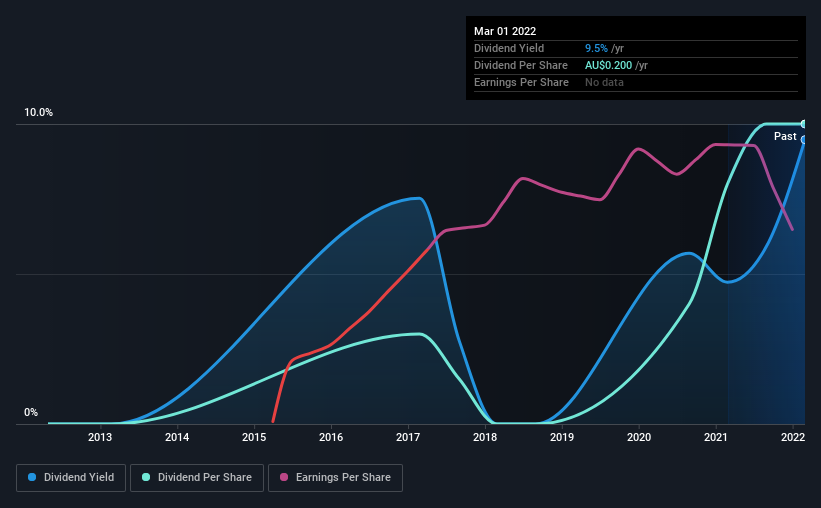TPC Consolidated Limited (ASX:TPC) has announced it will be reducing its dividend payable on the 23rd of March to AU$0.03. The yield is still above the industry average at 6.2%.
While the dividend yield is important for income investors, it is also important to consider any large share price moves, as this will generally outweigh any gains from distributions. TPC Consolidated's stock price has reduced by 36% in the last 3 months, which is not ideal for investors and can explain a sharp increase in the dividend yield.
Check out our latest analysis for TPC Consolidated
TPC Consolidated Doesn't Earn Enough To Cover Its Payments
We like to see robust dividend yields, but that doesn't matter if the payment isn't sustainable. Before making this announcement, the company's dividend was much higher than its earnings. Without profits and cash flows increasing, it would be difficult for the company to continue paying the dividend at this level.
Over the next year, EPS could expand by 27.4% if the company continues along the path it has been on recently. Assuming the dividend continues along recent trends, we think the payout ratio could reach 184%, which probably can't continue without starting to put some pressure on the balance sheet.

TPC Consolidated's Dividend Has Lacked Consistency
TPC Consolidated has been paying dividends for a while, but the track record isn't stellar. If the company cuts once, it definitely isn't argument against the possibility of it cutting in the future. Since 2017, the dividend has gone from AU$0.06 to AU$0.20. This implies that the company grew its distributions at a yearly rate of about 27% over that duration. Despite the rapid growth in the dividend over the past number of years, we have seen the payments go down the past as well, so that makes us cautious.
TPC Consolidated's Dividend Might Lack Growth
Given that the dividend has been cut in the past, we need to check if earnings are growing and if that might lead to stronger dividends in the future. TPC Consolidated has impressed us by growing EPS at 27% per year over the past five years. While EPS is growing rapidly, TPC Consolidated paid out a very high 229% of its income as dividends. If earnings continue to grow, this dividend may be sustainable, but we think a payout this high definitely bears watching.
TPC Consolidated's Dividend Doesn't Look Sustainable
Overall, it's not great to see that the dividend has been cut, but this might be explained by the payments being a bit high previously. Strong earnings growth means TPC Consolidated has the potential to be a good dividend stock in the future, despite the current payments being at elevated levels. We don't think TPC Consolidated is a great stock to add to your portfolio if income is your focus.
Investors generally tend to favour companies with a consistent, stable dividend policy as opposed to those operating an irregular one. Still, investors need to consider a host of other factors, apart from dividend payments, when analysing a company. As an example, we've identified 5 warning signs for TPC Consolidated that you should be aware of before investing. Is TPC Consolidated not quite the opportunity you were looking for? Why not check out our selection of top dividend stocks.
Valuation is complex, but we're here to simplify it.
Discover if TPC Consolidated might be undervalued or overvalued with our detailed analysis, featuring fair value estimates, potential risks, dividends, insider trades, and its financial condition.
Access Free AnalysisHave feedback on this article? Concerned about the content? Get in touch with us directly. Alternatively, email editorial-team (at) simplywallst.com.
This article by Simply Wall St is general in nature. We provide commentary based on historical data and analyst forecasts only using an unbiased methodology and our articles are not intended to be financial advice. It does not constitute a recommendation to buy or sell any stock, and does not take account of your objectives, or your financial situation. We aim to bring you long-term focused analysis driven by fundamental data. Note that our analysis may not factor in the latest price-sensitive company announcements or qualitative material. Simply Wall St has no position in any stocks mentioned.
About ASX:TPC
TPC Consolidated
Provides retail electricity and gas services to residential, commercial, and industrial customers in Australia.
Mediocre balance sheet with low risk.
Market Insights
Community Narratives



